#dahomey amazons
Text
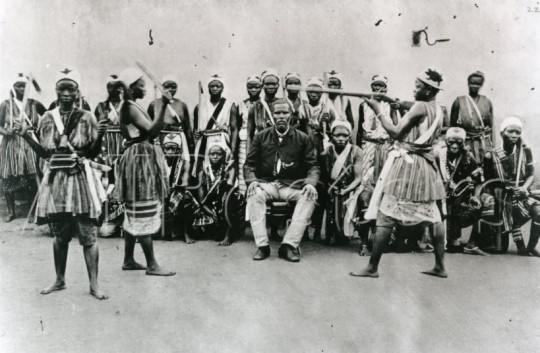
August first is Independence Day in Benin, so we’d like to share a little piece of Beninese history with you!
The people in this photo are a military regiment called Agojie - sometimes referred to as Dahomey Amazons by Europeans. The Agojie were soldiers in the army of Dahomey - now Benin - in West Africa in the 18th and 19th centuries.
The Agojie were all assigned female at birth but they expressed their gender in a variety of ways. Some renounced womanhood, and identified themselves as men. At other times, the group embraced womanhood in their war songs, comparing themselves to lionesses, and linking womanhood to their superiority over male regiments.
Numbering around 8000 at their height in the 1840, the Agojie were renowned for their fearlessness in battle, and considered the backbone of the Dahomean army.
Check out our podcast to learn more!
[Image source: Wikimedia commons]
96 notes
·
View notes
Text

"If there is one fact about the amazons that is indisputable, it is their consistently outstanding performance in combat. Not unexpectedly, practically the only author to cast doubt on this was Burton, for whom the idea that black females (not to speak of males) might excel on the battlefield was hard to accept: “The ‘Amazons’ boast themselves invulnerable, but readily retreat: an equal number of British charwomen, armed with the British broomstick, would - I lay, to speak Yorkishly— clear them off in very few hours.”Elsewhere he damns them with faint praise:‘The women are as brave as, if not braver than, their brethren in arms, who certainly do not shine in that department of manliness.”
The first inkling that the women soldiers of Dahomey might be first-class fighters comes from Labarthe’s informant who, in 1776, watched them perform shooting drills at Abomey and found them “very resolute”. By 1830, as Conneau learned at Whydah, their “bravery [was] a noted fact and [was] proverbial with the natives.” By the next decade the amazons’ reputation was established among Europeans too. At Cana in 1843 Freeman saw a “brigade” of them fire their guns. Not only did they shoot well, he says, but they “appeared totally void of fear”. The next year de Monléon remarked that the women had “often given striking proof of courage and audacity”. In 1845 Duncan saw amazon officers being rewarded for their “valour”.
Regarding the terror the women aroused among neighboring peoples, Chautard relates an anecdote from the 1880s. A group of amazons traveled from Whydah to Agoué, a port town beyond the kingdom near what is now Togo, perhaps as an escort for traders. The whole population crowded the town square to see the legendary ladies up close. The female “general” confronted the local male warriors and challenged the very best of them to a duel with swords to determine which sex was stronger. “In less than two minutes”, she boasted, “his head will adorn the tip of my sword!” To the shame of his sex, says Chautard, not one warrior volunteered.
The adjectives applied to the amazons over the decades were brave, courageous, valorous, valiant, fearless, intrepid, cruel, pitiless, merciless, implacable, relentless, bloodthirsty, fierce, ferocious, furious, audacious, impetuous, ardent, fanatic, disciplined, devoted (to the king), indomitable, redoubtable, formidable, vigorous, resolute, tenacious, determined, persevering. Often they were said to surpass their male colleagues — in valor, in intrepidity, in courage, in bravery, in cruelty, in discipline. “In this singular country”, Vallon reported, “the women’s army is accounted much more warlike than the men’s.” According to Bouët, there was no memory of any of the amazons fleeing combat whereas men had often been punished for doing it."
Amazons of Black Sparta: The Women Warriors of Dahomey, Stanley B. Alpern
#history#women in history#women's history#historyedit#19th century#18th century#dahomey amazons#benin#benin history#black women in history#african history#women warriors#warrior women
47 notes
·
View notes
Text
SEH-DONG-HONG-BEH // WARRIOR
“She was a leader of the Dahomey Amazons. In 1851, she led an all-female army consisting of 6,000 warriors against the Egba fortress of Abeokuta, to obtain slaves from the Egba people for the Dahomey slave trade. She was portrayed in a hand drawn, partially colored portrait in her uniform, armed with a musket and holding a captive's severed head, in the 1851 book "Dahomey and the Dahomans" by abolitionist Frederick Edwyn Forbes.”

10 notes
·
View notes
Text

These warrior women were also the main inspiration behind the Wukanda bodyguards!
🇧🇯⚔️
#history#dahomey amazons#african history#benin#military#female warriors#kingdom of dahomey#womens history#black panther#marvel#east central africa#wukanda#girl power#african women#comics#strong women#black history#marvel comics#military history#africa#powerful women#mcu#grl pwr#marvel cenimatic universe#benin history#nickys facts
35 notes
·
View notes
Quote
I am the Amazons of the Dahomey
Jamaica’s Nyabinghi
The Queen called Nefertiti.
Nambi E. Kelley, Xtigone
1 note
·
View note
Text
The Woman King review
Director: Gina Prince-Bythewood
Main cast:
Viola Davis, Thusu Mbedu, Lashana Lynch, Sheila Atim, John Boyega, Jordan Bolger and Hero Fuentes Tiffin.
Runtime: 135 minutes.
Does it pass the Bechdel test? Yes
Basic Plot:
General Nanisca, leader of the all-female Agojie, trains and leads a new generation of warriors to protect the Kingdom of Dahomey. Set during the 1800.
Overall thoughts:
The Woman King is a great film. What makes this film so great are its acting, storyline, themes, choreography and costume designs. Themes of war, slavery, racism, misogyny, violence against women, heritage and independence. Furthermore, the Woman King makes sure to critique the role of African nations in the international slave trade.
Overall rating: 5 out of 5 stars.
#the woman king#gina prince bythewood#viola davis#thusu mbedu#lashana lynch#sheila atim#john boyega#jordan bolger#hero Fuentes tiffin#dahomey#agojie#dahomey amazons
5 notes
·
View notes
Text

from the wikipedia page of the dahomey amazons also known as the agojie, the only known all-female army. they formed about a third of the military of the kingdom of dahomey in what is now benin, west africa and served as a regiment for 200 years starting in the 16th century.
#lol that last line#they were also esteemed in society and wealthy#girls get it done#agojie#dahomey amazons
1 note
·
View note
Text
Ending today's set of posts with the Ahosi:
Ending today's set of posts with the Ahosi, or the Dahomey Amazons as they are more famously known. By the usual sleight of hand of popular culture they are mainly famous today as inspirations for the Dora Milaje of the Black Panther series in both comics and in the movies, while the actual organization was a standard elite unit among many in the region noticeable mostly for being officially wives of the King of Dahomey and for their role in the slave trade.
Far from resisting it they were among the key units involved in the butcher and burn approach that brought the enslaved people from the interior to the ports that sold them, as well as fighting battles with mixed success against other African states. Against Oyo they did very well indeed, against the Egba they were slaughtered in carload lots with the rest of the Dahomeyan army. Against the claim that slavery was peripheral is the reality that elite army units were sent to be a part of the trade and in pre-industrial and post-industrial societies alike people do not send elite army units on minor aspects if they don't want to get those units to decide to play kingmaker and unveil 'the secret of empire.' What the elite units are sent to do matters to the temporal power of the state and always will.
They would also see service against the French in the Scramble in the final conquest and fall of the Kingdom of Dahomey.
#lightdancer comments on history#black history month#black women's history#military history#ahosi#dahomey amazons#kingdom of dahomey
1 note
·
View note
Video
youtube
Why I'm Boycotting "The Woman King" The Historical Truth Is Revealed!
Why this movie should be Boycotted. It glorifies an evil tribe that enslaved other Africans. The whites they fought were coming to stop slavery! The emergence of an all-female military regiment was the result of Dahomey's male population facing high casualties in the increasingly frequent violence and warfare with neighbouring West African states. Apparently their neighbors did not like having their people enslaved and fought back. This led to Dahomey being one of the leading tribes in the slave trade. They which used slaves for commodity exchange to get the guns they used to enslave their neighbors until Europeans, I think it was the French, brought an end to the slave trade in the region.
0 notes
Text
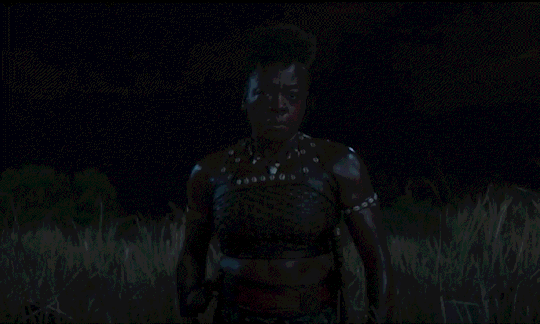
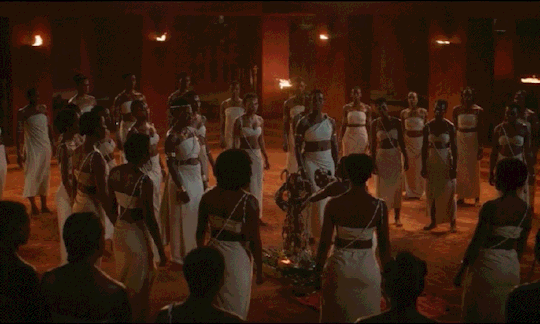
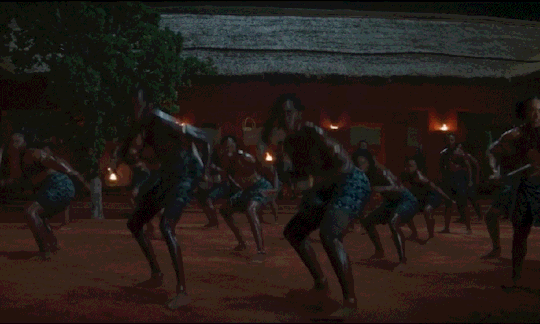
The Agojie | Dahomey Amazons
in The Woman King
#the woman king#agojie#dahomey#amazon#true story#history#moviegifs#netflix#netflix gifs#warriors#black women#soldiers#warrior tribe#king ghezo#nanisca#nawi#izogie#viola davis#thuso mbedu#lashana lynch#john boyega#filmgifs#black films#talented#oscars
50 notes
·
View notes
Text
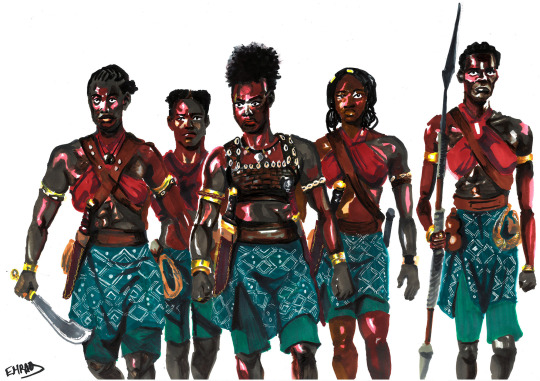
The woman king fanart
#the woman king#illustration#emrad#promarkers#copicmarkers#painting with markers#dahomey#amazon warrior#viola davis#lashana lynch#izogie#nanisca#miganon#artist on tumblr
116 notes
·
View notes
Photo
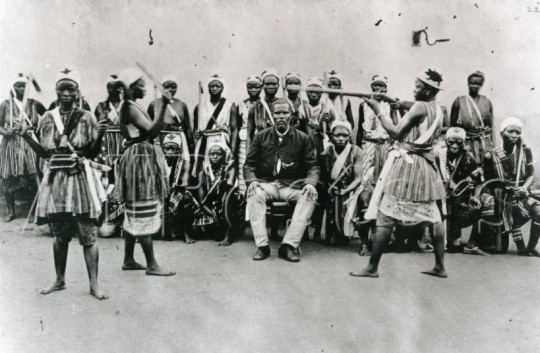
Black History Month: The Agojie
“As the blacksmith takes an iron bar and by fire changes its fashion, so we have changed our nature. We are no longer women, we are men.”
The Agojie were regiments of soldiers in the army of the Kingdom of Dahomey - present day Benin - in the 18th and 19th centuries.
They were all assigned female at birth but they expressed their gender in a variety of ways in their war songs. Some renounced womanhood, and identified themselves as men. At other times, as a group they embraced womanhood in their war songs, linking it to their superiority over male regiments in the army, singing, for example “Lionesses are more fearsome than lions./Because she has her cubs to defend…”
At the height of their power, the Agojie were considered the backbone of the Dahomean army, numbering around 8000, or a third of Dahomean soldiers. They were renowned as skilled, fearless fighters who never retreated. Oral histories tell how during an attack on the Egba city of Abeokuta, an Agojie broke through the Egba ranks and scaled the city walls, before turning her back on the Egba, taking a seat, and beginning to smoke a pipe.
At home in Dahomey, the Agojie held a high status. British naval officer Arthur Wilmot describes how they were “fully aware of the authority which they possess, which is seen in their bold and free manner, as well as by a certain swagger in their walk.”
Learn more
[Image: photo of a group of Agojie, some pose with weapons including guns and large knives]
[Opening quote source: Frederick E. Forbes’ Dahomey and the Dahomans: Being the Journals of Two Missions to the King of Dahomey, and Residence at His Capital, in the Years 1849 and 1850, Volume 2 p119]
#black history month#black history#queer history#lgbt#lgbtq#gender#dahomey amazons#agojie#benin#african history
204 notes
·
View notes
Note
What did you do on your last date with your husband?

We went to the theater to watch The Woman King. It was very good. I really enjoyed it.
#The Woman King#Woman King#Viola Davis#Movie#Movies#Film#Films#Actress#Actresses#Africa#Agojie#Dahomey#Amazons#Woman#Women#Nanisca
69 notes
·
View notes
Text

#dahomey amazon#dahomey#dahomey kingdom#ixith century#b&w#black and white#19th century#photography#africa
2 notes
·
View notes
Text

Dahomey Warriors
0 notes
Link
Audre Lorde references the Dahomey in Cancer Journals
-MS
1 note
·
View note